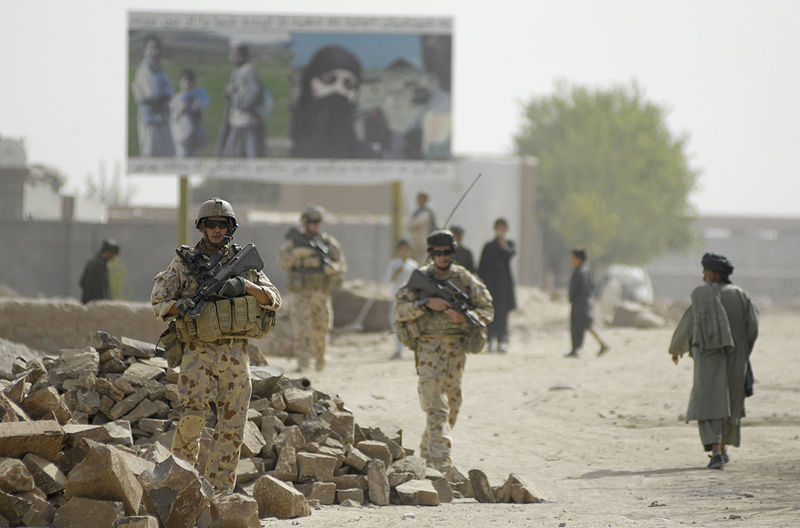
The terrorist attacks on the World Trade Center and the Pentagon on September 11, 2001, sparked a war that would dominate President George Bush’s presidency and become a recurring issue in the future.
Soon after the attacks, President Bush signed the Patriot Act and formed a new Department of Homeland Security, created in a consolidation of 22 other existing offices, in 2002. Immigration and Naturalization Service and the US Customs Service, which were both formerly a part of the Department of Justice, were consolidated into the U.S. Immigration and Customs Enforcement (ICE). The agency has caused a large increase in deportations, which have nearly doubled since 9/11. The Patriot Act, which would soon be the subject of ongoing controversy, enabled the U.S. government to collect information from citizens’ phone calls, emails, internet browsing history, and other personal details in order to identify potential terrorists. The budget of the Department of Homeland Security almost tripled in the coming years, from $16 billion in 2002 to over $43 billion in 2011. This increase in defense spending demonstrated the shift in priorities to foreign affairs and many citizens protested that the government should be allocating more money to solve domestic issues, especially when the recession of 2008 set in.
Bush also sent American troops into Afghanistan to break up terrorist groups, specifically the Taliban under Osama bin Laden. While the Taliban was disrupted, bin Laden was not captured until later. Bush also strengthened intelligence gathering services and the military in order to combat terrorism. His 2003 invasion of Iraq was controversial, and while he did succeed in capturing Saddam Hussein, the invasion and subsequent deaths of both American soldiers and Iraqi civilians cast a shadow over the operation. The invasion was based largely on Hussein’s regime allegedly having weapons of mass destruction, but none were ever found. He pledged that the U.S. would help Iraq establish a democratic government in order to gain an ally in the war on terror, but American entanglement in the conflict there became increasingly unpopular. Although the U.S. officially withdrew from Afghanistan in 2014, the military remains active there in an attempt to stop ongoing terrorism.
Sources
This post, though we are no longer learning anything new and didn't really go over past 2000 is very interesting to me. I am very unfamiliar with the US "war on terror" and the entirety of Muslim-US relations. Do you think the 2003 invasion was justifiable or should the United States not have entered Iraq? What do you think will happen in future years regarding US-Middle East political relations?
ReplyDeleteI think the reactions around the world have also been very different from in the past and represent a changing world. The United States united the world against terrorism in 2001, but this unity soon began to break apart as the world splintered about issues. The world was a different place in the 2000's with the end of the Cold War over a decade ago. The United States had its power, but its power over European policy was being eroded as they looked inwards to their own EU. The War in Iraq polarized certain nations who ended up not following the United States on its mission (the most prominent being France). The international community began to sound out their disapproval as the war dragged on.
ReplyDeleteInternational perception has been important ever since the United States entered the world stage, but now with the internet, international perception is even more so important. As millions of people get access to cheaper and cheaper computers, opinions spread and the United States must be wary of its image if it is to hold its spot in the international community.
This post is very well researched and provides a large amount of information in regards to the effects of the War of Terror. However, I believe that the history of this massive retaliation is just as important. Many historians argue that the war had been building up even from the time from when the OPEC nations placed an embargo on oil in the 1970s. I wonder how the history of the United States dealings with the nations correlated with the war on terror has influenced our war tactics today.
ReplyDeleteI think its cool you did a topic that is so recent and we have all heard a little about the effects but don't know that much. I think you should have gone over Bin Laden a little more. What do you think the world would look like today if 9/11 had not happened?
ReplyDeleteI think it's interesting to consider the affect that 9/11 and terrorism continue to have on US domestic policy. You mention the Patriot act, but that's now expired. It's been replaced by the USA Freedom act which has less allowance for surveillance and data collection. There's been a growing movement of people standing up more for privacy rights, like with the whole iPhone encryption thing that's been going on. Do you think that this shift towards more demand for privacy over surveillance indicates a lessening of the impact of 9/11?
ReplyDeleteYour post is very well written and I was able to get an insight of the changes that were made after the terrorist attack. However I am interested on the changes that Bush made to "strengthened intelligence gathering services and the military in order to combat terrorism" could you expand more on what type of changes he made to strengthened the security and how it has impacted us? does this mean we hardly have any privacy due to this terrorist attack?
ReplyDelete